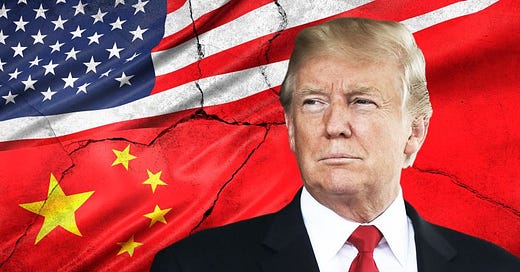The Week That Matters (14-18 Oct, 2024)
"We are in the early stages of multi-year recovery in capital markets" Morgan Stanley
This week the newsletter will argue the following:
Tariffs are as American as Apple Pie.
Software stocks: The Rule of 40 revisited.
The rest of the decade might be a bonanza for capital markets.
Chinese bears will regret their Schadenfreude.
Speculation is back - three stocks to watch in Europe.
Tariffs are as American as apple pie
In 1930, John Maynard Keynes wrote an essay called, “Economic Possibilities for Our Grandchildren.” It was an optimistic view on what mankind could achieve by 2030, and contrasts with the less optimistic view he developed as the depression got worse just a year or two later.
In the essay, he argued that nothing really interesting happened to the global economy from the birth of Jesus Christ to about 1750. The economy grew very slowly and occasionally went backwards due to events like the Black Death. There were no significant leaps forward.
Global growth only picked up from the mid 18th Century. And it was a cold, wet island nation, Great Britain, that rode the wave better than any other country. By the 19th Century, life was “glorious” for Great Britain, to coin a term used by Keynes to describe life in London at the time.
Not only was Great Britain at the epicenter of the industrial revolution, but its empire also stretched around the globe. The City of London was innovative, and its firms were willing to take risk, partly because of its tradition of funding clipper ships for over 200 years (many didn’t come back) and partly due to the increasing presence of the European banking dynasties, who had grown rich on Napolean’s wars. Great Britain also had the advantage of being geographically lucky. It was in the same time zone as Africa more or less and only an ocean away from modern-day USA, the greatest economic discovery in history.
Laissez-faire thinking dominated
Being an island nation, with an established maritime tradition, it was second nature for Great Britain to take to international trade. It embraced a free trade, laissez faire economic policy.
It was in this environment that neo-classical economic theories became dominant. As Great Britain was the most economically successful country in the world, academics in its fine universities naturally concluded its laissez-faire approach was the best way to manage an economy. Free trade was celebrated the way democracy is today.
Unfortunately, as we have learnt with democracy, a one size fits all approach to politics and the economy doesn’t work. It ignores key characteristics and the circumstance of a nation or a culture. With regards to free trade, the academics didn’t take into account how Great Britain benefited from a fortunate confluence of events and trends, which were not common to all countries, namely:
The emergence of transformative technologies such as the steam engine and the heat-transfer lamp.
The establishment of a financial system that could operate effectively across borders.
A very cheap labor force, which unfortunately included the slave trade.
Control of the most important product of the time, cotton.
History rhymes - free trade loses its shine
Just as is the case with the Milton Friedman ilk today, no one really questioned neo-classical economists for most of the 19th Century. Why would they? Great Britain remained prosperous. Unfortunately, cracks in the system began to emerge in the early years of the 20th Century.
First, just as we see in the US today, the outsourcing of production to countries that could manufacture a good more cheaply (the USA in this case) meant the working conditions of the British public deteriorated. The spoils of the slave trade and the British Empire may have built a place like Berkeley Square in Mayfair but most people in England didn’t benefit at all. Many lived in abject poverty. There was no job security and there was no provision of healthcare. Sound familiar?
Second, and more interesting perhaps, Great Britain had started to realize it had become vulnerable. It was too dependent on the USA for its goods just as the USA has become too dependent on China. The issue came to a head in 1917. Great Britain nearly ran out of food. The German U-Boats had perfected the art of destroying US ships in the Irish Sea (isn’t that why the Lusitania was sent there?). Those ships brought in most of Great Britain’s food supply. It was a supply shock that was similar to what we experienced during COVID.
Echoes of the 1930s
John Maynard Keynes was a die-hard free-trade guy in his youth, but his views changed markedly from the 1920s. First, he believed the way the Treaty of Versailles would cripple the Germans would lead to trouble. It did! Instead of being so harsh on the nation, he believed the Allied Powers should have built Germany’s economy up again. Sometimes, you couldn’t leave things to luck. You needed a strategic plan.
Second, he began to question the neo-classical idea that the economy would self-correct. As he said to President Roosevelt in 1938, “the private sector roars like lions when times are good. It meows like domesticated cats when times are bad.” Sometimes, the demand side of the economy needed help from government.
He even started calling himself a socialist for effect. He wasn’t one of course but he did believe that in order for Great Britain to get out of its depression, government needed to allocate more capital, embrace trade tariffs and strive for self-sufficiency for a period at least! Sound familiar?
The Importance of Donald Trump
Donald Trump is no John Maynard Keynes, but he seemingly has good instincts. To be fair to him, he has always questioned the logic that was heavily promoted to get China into the WTO. He was not the only one. The investment banker, Sir James Goldsmith, thought it was a short-sighted initiative, which would have a significant impact on the societies of the West.
The author is not saying he agrees with them but it’s undeniable that the US since 1980 has many similarities with Great Britain in the 19th Century:
The US embraced the free trade mantra, especially after the Soviet Union collapsed in the early 1990s.
The US was at the epicenter of the second industrial revolution, namely the internet and digital products.
Labor costs were not really an issue. Ronald Reagan’s approach to the unions meant real wages collapsed and if things weren’t cheap enough, corporates could outsource production to the world’s factory, China.
Finally, although the US did not have an empire, per se, its dominant currency and 17 aircraft carriers effectively meant it ruled the world too.
And during that period, just as was the case with Great Britain, the USA has seen its domestic industries be decimated. Working conditions for at least 50% of its population has gotten worse. And it did become heavily dependent on China for key supplies. Interestingly, Great Britain often accused the USA of stealing its technologies in the 19th Century. History rhymes?
In fairness to Trump, he was the catalyst for people to pay attention to this dynamic. Since maybe Ross Perot in the 1990s, no one really touched upon it in politics. He was a proponent of onshoring long before Janet Yellen and he implemented tariffs on China, that were continued by the Biden administration.
The issue, however, is what will he do now if he gets in again? He is surrounded by people who would have felt at home amongst the US protectionists of the 1930s. Although the US has promoted free trade since at least the fall of the Soviet Union, with very open borders, the protectionist tradition in the US runs deep. As late as the 1980s, there were those in the Senate who wanted to put sanctions on countries which had a trade surplus with the US! If anything, the last 30 years have been a blip in its trade history.
Worryingly, some of Trump’s pronouncements are sounding extreme. His recent campaign pitch that he would bring the furniture industry back to North Carolina sounded as unrealistic as some of the autarky speeches of the far-right parties in the 1930s. The author has a lot of sympathy for displaced workers, but we need to understand that China is now the factory of the world. That won’t change. Instead of furniture, new industries must be created.
Indeed, the pivotal moment in the early 1930s that made everything worse was the signing of the Smoot-Hawley Tariff Act of 1930. The act was described as “vicious, extortionate and obnoxious” by even US economists. It resulted in a series of retaliatory measures by countries who were affected by it, which meant global trade collapsed.
If Trump goes down that path, it could be a disaster. The author is optimistic he won’t, however. China, the main focus for his rhetoric, is too important for the US just as the USA was to Great Britain in the early part of the 20th Century. Not only does it support many of US companies with key components, but it is also a major consumer of the USA’s last great export, food. The Chinese can always start eating Brazilian soybeans, for instance.
Perhaps, Trump is playing hardball right now. He did The Art of the Deal after all. The optimist in the author believes the big surprise will be he does a trade deal with China in the first few weeks of his time in office, which kills the uncertainty in the market.
The question then is how does he fund the tax cuts? Would that lead to him having a Liz Truss moment? The markets are seemingly very complacent about the elephant in the room, the debt problem. Let’s see.
The Rule of 40
Software names have performed well of late. They hadn’t done great compared to the semis for most of the year and were trading at a discount to their average multiples on sales. But now they’re breaking higher. The IGV I-shares Expanded Tech Software Sector is nicely above $90 and the chart looks strong.
Software stocks never come cheap, and many have cap tables that are heavily in favor of their management team (see The Blind Squirrel for a great rundown on this). But we do live in buoyant times and software could easily become the second wave of AI. The space will also benefit from declining rates.
Keep reading with a 7-day free trial
Subscribe to Mateen's Newsletter - Discuss The Tape to keep reading this post and get 7 days of free access to the full post archives.





